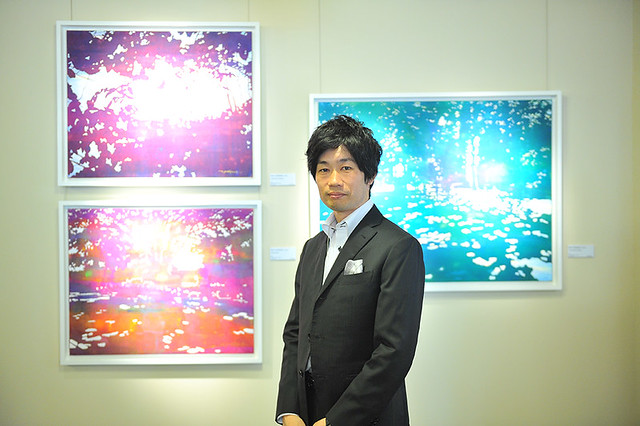In this two-part series,
This coincides with the opening of Nikei Fine Art in Singapore, a gallery founded by Mr Hiroshi Kato. The gallery focuses on showcasing abstract art from established and emerging artists around the Asian region.
PROFESSOR NOBU YAMANAKA: Firstly, we are appreciative of Ms Kato [the gallery director of Nikei Fine Art], who tried to engage us by showing abstract art so that it will be known to more people overseas. We want to thank the gallery for letting us participate in this exhibition, which is the first
for us in Singapore.
YEN PHANG FOR
PROFESSOR JUN OGATA: The possibility of abstract painting is without explanation… there is no item which is obvious in the painting itself. It depends on the viewers themselves, on how they interpret the painting. So the painter of the abstract painting and the viewer may not have the same impression and this is quite common.
That is the aim objective of abstract painting… it doesn’t convey a certain message by looking at the painting itself, and it doesn’t convey the same message to all viewers. Each viewer will have a different view, and the viewer’s impression can be different from that of the painter’s.
Even the painter themselves, depending on their mood as well depending on their condition, they may paint a different painting at various times. Similarly, the viewers themselves may have a different impression when they view it at different times. So in my case, I would expect the viewer to view it and form their own impressions.
We make use of colour in the paintings to express what we want to express. The same principle applies to old paintings, current paintings, and also future paintings. The colour is the focus, the emphasis… the way we paint is that before the viewer looks at the painting in detail, they will already have an impression by glancing at the colour alone.
Professor Jun Ogata
RYO YOSHIKAWA: In my case, painting is a tool of communication. So I don’t speak English, I don’t speak French, but through the paintings I can convey what I want to convey to the viewers anywhere in the world.
This is the first time I come to Singapore. If I want to paint something about Singapore, that means I have to know the situation, the environment, the people I meet, then it may be translated into the next painting I want to make. I want to do something new every time, so this is a good experience, coming to Singapore.
Ryo Yoshikawa
Artitute: Can you describe your process of coming up with a new piece?
Prof. Yamanaka: So as far as abstract painting is concerned, the common language is the colour and the shape in my personal opinion. There are two schools of thought for artists – one is to show whatever they want to show, the other is different … I may be belong to the latter. As an abstract painter, what I expect the viewer to see is that not what I think of the painting.
The painter has painted something but the interpretation can be anything. Depending on the viewer and at different times the interpretation can change. Based on that, that will be a sort of communication between the painter and the viewer. That kind of nuance this is what we are after.
Professor Nobu Yamanaka
But finally of course, both sides have to feel that it is something beautiful, something they cherish.
Look out for the Part 2 of the interview, where the artists discuss the universality of abstraction.
Check out the works of Nobu Yamanaka, Jun Ogata, and Ryo Yoshikawa at their debut exhibition in Singapore, “Kaomise”, running from now till 4th November at Nikei Fine Art, Raffles Hotel Arcade, #01-34, tel
6338-9073. Website: http://www.nikeifineart.com/
Editor’s note: The interview was conducted with the aid of a translator, and has been edited and condensed for space and clarity.

Yen Phang
Despite his legal training, Yen has chosen to pursue a career in the visual arts. Apart from being a closet-painter, Yen Phang is largely still an unknown quantity. Forever random, but always polite.


